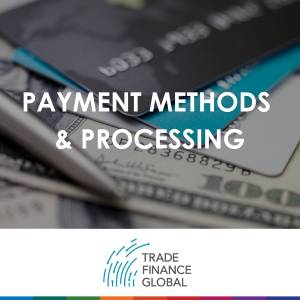Payment Methods & Processing

Access trade, receivables and supply chain finance
We assist companies to access trade and receivables finance through our relationships with 270+ banks, funds and alternative finance houses.
Get started
Content
What are the types of payment methods and processing available?
In today’s dynamic world of commerce, many payment methods and processing options have emerged, providing consumers and businesses with convenient and secure ways to transact.
The most widely understood and accepted form of payment is cash. Traditional cash payments remain a trusted form of exchanging value, particularly for face-to-face interactions, and allow for quick and straightforward transactions without the need for complex electronic infrastructure.
While cash may have once been king, in today’s modern world, it is becoming less necessary on a daily basis. Debit and credit cards have become a staple in the payments landscape, enabling consumers to make purchases without the need to carry coins and banknotes. With credit cards, users can even defer payments until a later date, instantly creating liquidity.
In a more recent innovation, mobile payments have gained significant popularity, leveraging the power and ubiquity of mobile devices. Through dedicated mobile wallet apps like Apple Pay or Google Pay, users can link their payment cards and make payments from their devices. The ease and convenience of mobile payments make them an attractive choice for on-the-go transactions.
While these methods are great for everyday consumer transactions, other payment mechanisms are necessary for larger or business transactions.
One of the more popular such mechanisms is the bank transfer. These offer a secure and direct means of transferring funds between accounts. Whether for large transactions or regular payments like salaries or bills, bank transfers provide a reliable and trusted method, ensuring the rapid movement of funds between financial institutions.
Electronic Funds Transfers (EFT) are another efficient option for transferring funds electronically. They enable businesses and individuals to make secure payments, facilitating financial transactions such as supplier payments or international transfers.
Online, payment gateways act as critical intermediaries between buyers and sellers, securely processing payment information and facilitating smooth transactions from various payment methods, including credit cards, debit cards, and digital wallets. They are a crucial backbone for e-commerce, allowing businesses to seamlessly accept online payments.
In recent years, the emergence of cryptocurrencies, like Bitcoin and Ethereum, has introduced a new dimension to payment methods. Cryptocurrencies leverage blockchain technology to enable secure and decentralised transactions, offering an alternative for online purchases or peer-to-peer transfers.
Some governments are also exploring implementing their own state-sponsored versions of cryptocurrencies, known generally as central bank digital currencies (CBDCs).
As technology advances, payment methods and processing options will undoubtedly evolve. With each method having its own strengths, consumers and businesses can choose the option that best aligns with their needs, preferences, and the nature of their transactions.
In this vibrant landscape of payment methods and processing, it is essential for individuals and businesses alike to stay informed and explore the ever-expanding range of possibilities.
What’s the payment processing for B2B transactions?
Most businesses would agree that getting paid is pretty important.
B2B payments encompass various transactions, from supplier payments to wholesale purchases, making reliable and tailored payment methods and a secure payment processing system crucial for smooth operations and financial efficiency.
Businesses need flexibility to accommodate the preferences and requirements of their partners and clients. By offering multiple payment options, such as credit cards, electronic funds transfers (EFT), bank transfers, and even automated clearing house (ACH) payments, businesses can cater to the specific needs of their counterparts.
ACH is a method of electronic funds transfer that enables businesses to transfer funds directly between bank accounts. It is commonly used for recurring payments such as payroll or vendor payments.
Integrating a payment gateway is another vital component of B2B payment processing. Payment gateways act as a secure bridge between the business and its financial institution, facilitating the authorisation and transfer of funds. They enable businesses to securely process payments from various sources, including online platforms, invoices, or point-of-sale systems, ensuring efficient payment processing and enhancing the customer experience.
By embracing efficient payment processing for B2B transactions, businesses can optimise their financial operations, strengthen partnerships, and drive overall growth and success.

Payment processing technology
Staying updated with emerging payment technologies and trends is crucial in the ever-evolving B2B payments landscape. The rise of digital wallets, blockchain-based solutions, and open banking APIs presents opportunities for enhanced transaction speed, transparency, and convenience. Exploring these innovations and assessing their suitability can provide businesses a competitive edge and unlock new avenues for B2B payment processing.
Technological solutions allow payment systems to be integrated with accounting software, enterprise resource planning (ERP) systems, or other back-end platforms. This can further automate payment reconciliation, invoice generation, and financial reporting, enabling businesses to better focus on core operations.
Payment processing technology encompasses a variety of tools and services that facilitate the movement of funds between buyers and sellers in an electronic payment transaction. Three key components of payment processing technology are payment APIs, payment gateways, and payment processing software.
As mentioned above, payment gateways are software applications that connect sellers with their financial institutions and allow them to collect customer payments through various methods.
Payment APIs are software tools and protocols that allow different systems to communicate and exchange information. They often integrate payment processing functionality into other applications or systems, such as an e-commerce website or a mobile app, allowing businesses to securely manage real-time transactions.
Payment processing software comprises applications and tools that allow businesses to manage and process payments. They typically include features such as payment tracking, payment processing, fraud detection, and payment reporting and can be installed on a business’s own servers or accessed through a cloud-based service.
Together, these payment tools provide businesses with the infrastructure they need to securely and efficiently process electronic payments, ultimately helping improve cash flow, reduce payment processing errors, and provide a better payment experience for their customers.
Payment processing compliance and regulations
Payment security and fraud prevention are paramount for B2B payments.
Businesses must prioritise implementing robust security measures to safeguard sensitive financial information. This includes using encryption technologies, regularly monitoring and updating security protocols, and adhering to Payment Card Industry Data Security Standards (PCI DSS).
The PCI DSS is a set of security standards to ensure that all companies that accept, process, store, or transmit credit card information maintain a secure environment. It requires businesses to implement and maintain security controls and processes that protect against data breaches and theft of sensitive cardholder data.
Not only is compliance with PCI DSS mandatory for all businesses that accept credit card payments, but it helps to instil trust and provide a secure transaction environment, allowing businesses to foster stronger relationships with partners.
Another key area of payment processing compliance is adhering to the relevant data privacy regulations, such as the General Data Protection Regulation (GDPR) in the EU and the California Consumer Privacy Act (CCPA) in the USA.
Such regulations require businesses to protect the personal data of their customers, including data collected during the payment process, such as names, addresses, and payment information. Under these and other applicable regulations, businesses must implement appropriate data security measures and obtain explicit customer consent before collecting and processing their personal data.
Anti-money laundering (AML) regulations are yet another compliance mechanism designed to safeguard the payments environment. This measure helps prevent criminals from using electronic payment systems to launder money or finance criminal activities.
Compliance with AML regulations requires businesses to implement policies and procedures that identify and report suspicious activity and to perform due diligence on their customers and partners to ensure they are not engaging in illegal activities.
By complying with payment processing regulations and standards, businesses can protect their customers’ personal and financial information, prevent fraud and data breaches, and maintain the integrity of the electronic payment system.
Non-compliance with payment processing regulations can result in hefty fines and legal penalties, not to mention irreparable reputational damage to a business.
Publishing Partners
- Payments Resources
- All Payments Topics
- Podcasts
- Videos
- Conferences














